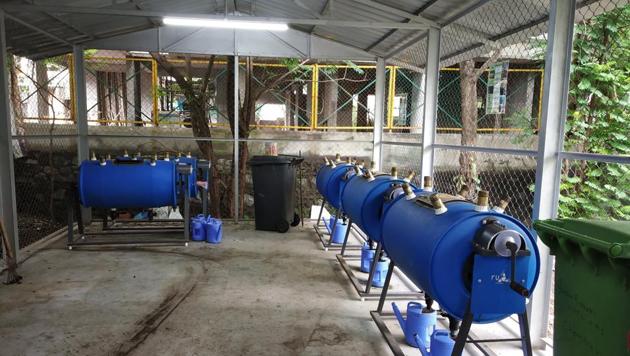Chembur housing society treats 90% of its trash at source
In the first few months of the project, of the 16,425 kg wet waste generated by the society, 1,800kg of manure was procured.
Over the past 15 months, a housing colony in Chembur has reduced 90% of their trash that would have otherwise ended up at city landfills by implementing waste management at source. With 73 row-houses and close to 300 residents, Green Garden Apartments in Shivneri Nagar, Govandi (East), mitigates over 65kg carbon dioxide (Co2), generated by diesel vehicles transporting waste from source to dumping grounds, annually.

A study by the Indian Institute of Technology-Bombay found that 67,401.38 tonnes of CO2 is emitted per year while transporting waste from Mumbai to its landfills. This is equivalent to greenhouse gas (GHG) emissions from 14,310 passenger vehicles driven in one year.
Residents of the Chembur society began their project in May 2018. They started to segregate waste at the household level into three bins – wet waste, dry waste and trash. Following this, 50kg of organic waste was converted into nutrient-rich manure daily, using five large bio composter machines. For example, in the first few months of the project, of the 16,425 kg wet waste generated by the society, 1,800kg of manure was procured.
This manure is used to maintain an 8,000-sq-metre green space within the society, apart from gardens located at the front and back end of each row-house. The daily dry waste is collected and sent to a private recycling firm. Overall, only the society’s biomedical and electronic waste (accounting for 10%) is sent to dumping grounds.
“Earlier, we had tried implementing the process on our own but owing to doubts, it was stalled. In February last year, the BMC gave us an ultimatum to ensure that we treated waste at source since we had a large society. We then started working towards not only reducing waste going to landfills but also preserving the environment,” said Subhadra Ramesh, resident.
In three months, residents studied half a dozen decentralised waste management systems offering different solutions. “We came across waste management experts RUR Greenlife, who provided technical expertise to implement a suitable program for the society,” said Rohit Chemburkar, another resident. “We are glad to have contributed to this initiative by treating all our biodegradable waste at our own facility for 15 months.”
RUR Greenlife estimates that 400 tonnes of organic waste will be recycled annually. The society also has a high speed shredder for branches and coconut fronds and tender coconut shells, further reducing the landfill load by diverting these fibrous components into composting.
“With over 70 houses practising a community composting project, the decentralised waste management movement is spreading across the city. This form of circular economy is highly sustainable and is a holistic solution to mitigate GHGs generated owing to transportation of waste,” said Monisha Narke, founder and CEO, RUR Greenlife.



